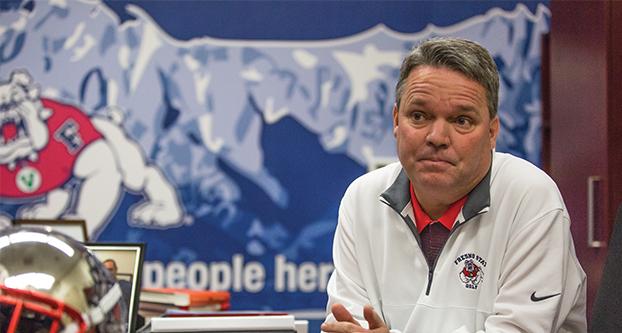Ever since Fresno State Athletic Director Jim Bartko told someone what happened during his childhood, a burden was lifted.
Bartko revealed to the public in the middle of January that he was molested by a Catholic priest about 35 times as a child. He traveled in December to Tucson, Arizona, to a rehabilitation facility, Sierra Tucson, and received treatment for sleeping issues, anxiety and anxiousness.
Bartko never spoke of his experiences as a child. But after more than 40 years, he decided to talk publicly about the molestations.
“It’s kind of funny, after 40-some years you never say it,” Bartko said. “But when you get asked the hard questions, it’s kind of like, ‘Do I tell the truth, or do I lie about it or keep it in?’ and I just said it.”
It was a huge burden to first discuss the abuse, Bartko said, but after returning to Fresno, it became much easier. Talking about the molestations has been therapeutic, he said, whether it is with counselors or people at the grocery store.
Many people throughout the country, whom Bartko has never met, including fellow athletic directors, have sent letters and emails offering him their support, some saying that his revelation has helped them or their family.
“People have called in saying, ‘I had a daughter who went through it. Now with talking, it will help out,’” Bartko said. “And that’s what my wife and I need to figure out — outside of our jobs and being parents and everything else — how can we make a difference in somebody else’s life?”
Although his goal is to help others by telling his story, at times he finds it hard to believe that he has made an impression on people.
“I had many people call me and send me emails [saying] that I’ve had an impact,” Bartko said. “And I find that hard to believe, because I’m just a normal guy from Modesto.”
Many victims of child abuse and sexual assault struggle to disclose their experiences. Some, like Bartko, do not say anything for decades, if ever.
“I was very wrong in holding it all in for all these years,” Bartko said. “I think that’s what I want to get across to people — holding it in does you no good.”
Children often do not reveal traumatic experiences for a variety of reasons ranging from threats made to the child and them simply not understanding the situation, said Maggie Armistead, Title IV-E BA program coordinator at Fresno State.
The Title IV-E program trains students to be Child Protective Services workers. Armistead has experience as a CPS worker and has dealt with many children who have been abused. Many of the children also struggled to talk about their experiences.
“I think that’s a big step, to be able to disclose,” Armistead said. “That’s part of the healing process. That’s a huge step just to be able to help someone.”
Given Bartko’s position in the university, many people in the Fresno community listen to what he says.
“For him, it’s sending the message that it can happen to anyone,” Armistead said. “And it does happen to people, and there [are] probably many people out there that have never disclosed.”
Armistead said students who have had traumatic experiences should seek counseling and therapy to talk about the issues. She recommends students visit the Student Health and Counseling Center on campus.
“Just being able to tell someone is difficult,” Armistead said. “I look up to [Bartko] for just being able to say this.”
The center offers many services to assist victim of sexual violence with individual and group counseling, Lisa Risch, a confidential victim advocate at the center, said in an email.
The center also helps victims file claims with the victim compensation program, which provides financial reimbursement for crime-related expenses, Risch said.
To help victims, Risch said, people should listen actively and make themselves available to share their experiences. False reports are rare, and disclosing traumatic experiences can be very difficult.
“I hope [Bartko] knows that with that disclosure, he positively impacted a great number of people, though he may never know them by name, and that he humanized and personalized the experience of survivors of that type of abuse and violence,” Risch said. “He also serves as a model that people can overcome traumatic experiences of their past, and he did so in a gracious manner.”
Bartko says the support from the community has shaped him and has given him a chance to move forward.
“It makes you feel good, but it’s not something I want to be proud of,” Bartko said. “Now the defining moment for me is what I do with my experiences moving forward.”
Revealing his secret was crucial for him and has made an impact on how he thinks about things, Bartko said. He has a better perspective for what he does, and as important as sports are, he said that he is here for a bigger purpose.
The athletic director understands the difficulty of talking about abuse, but feels that disclosing is vital.
“You can never tell somebody when to talk about it,” Bartko said. “But I’ll guarantee you this — not talking about it is worse than the outcome of talking about it, because there’s a sense of relief.”
Bartko is unsure of exactly how he will advocate for victims of child abuse, but he is signed up to speak with many groups throughout the Valley to raise awareness and help those in need. He wants people to know that if they have been negatively affected by someone, they should speak up.
He said, “I’m hoping that if I have any influence in the community, I can make people realize that you can go on with your life and be successful and be happy — put it behind you and help others.”




